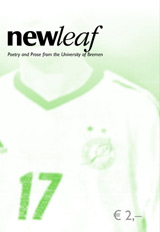editorial

A whole decade
The appearance of this issue of newleaf marks the first decade of the magazine's life. 'Issue One (Spring 1994)' had only 27 pages, cost absolutely nothing and was read by only a hundred or so members of the university fraternity and friends. It was very much a workshop product, and the rule - which was then extended to No. 2 but dropped in Issue 3 when newleaf became a 'proper' magazine - was that everyone who took part in the workshop would be represented in the pamphlet. So the quality is patchy. Other evidence of the workshop source is that there are seven texts called 'The First of May' (an obvious assignment in a summer semester), five called 'A Slow Dusk' (indicating an intertextual homework based on Wilfred Owen's 'Anthem for Doomed Youth') and three contributions with the name Croatia or Bosnia in them - clues that we had taken up the theme of war and applied Owen's approach to the conflicts of the early nineties. But there are also signs which are unmistakably newleaf: the format (even if the layout is very Word for Windows 2), the typical mixture of poetry and prose - and the proliferation of sonnets.
Most of the authors of the first newleaf have gone on to better things - one even made it a few years later into the Big Brother house on TV. None of them, to our knowledge, have become serious full-time writers - that would only come with the second generation of our contributors. Many, though, have gone into teaching and taken with them the idea that teaching literature and getting students to actually write it can - and should - be meaningfully combined.
Meanwhile, nearer the present, the oft-hyped 'typical mixture of poetry and prose' was slowing being subverted in the secret underground bunker somewhere in Bremen that acts as the newleaf editorial office. As the contributions - which seem to get better and better each time our eight assistants slit open the mailbags every morning - tumbled in, it seemed that there was just so much good short prose to choose from that by the time we had 36 pages together only four had poetry on them. That, we agreed, looked decidedly lopsided, and nobody short of a post-post-modern fetishist wants their literature lopsided, do they? So the poems went into the lead-lined box we keep three storeys underground labelled '18?' and we got out the rubber stamp with 'Guaranteed poetry-free' on it. But could another explanation for more prose in the pipeline perhaps be that there are simply so many stories to tell?
The Oliver Chrystossek cover this time displays the jersey of another famous anglophile No. 17 who still lives in Bremen. Four of the inside illustrations - on pages 8, 15, 20 and 33 - are by Martin Kakies, the Bremen artist who illustrated Uche Nduka's The Belltime Letters, which we published in 2000. The bear on page 22 is by Hannah Watson.
Our topics this time? Three devils; a few strong women; a party cynic; an investigative journalist in a not-too-distant future or maybe even present; a couple of girls trying to leave home and not quite cutting the umbilical cord; nearly as many corpses as the end of Macbeth (count them); and ... well ... a frog with a Gulliver complex. We're a lot further into the supernatural and the paranormal than we normally venture; is this a phenomenon of slight uneasiness at the beginning of a rather frosty new digital millennium, or some such matter? Also please note that with one child narrator we're trying to reclaim our innocence, and that being visited by the Devil might not be quite so scary after all, considering that what's going on in the world is much worse. Some think humanity seems perfectly capable of doing evil pretty well on their own.
Oh, and see if you can spot the homages to Tess Gallagher's poem 'Black Silk':
She was cleaning - there is always
that to do - when she found,
at the top of the closet, his old
silk vest.
As always, thanks go out to Eileen and Uwe Westermann of Business Centre Bremen, who have been so good to us over the years. Their company has now expanded and merged with inlingua. You'll find an advertisement on the last page.
Reading newleaf has never been easier...
Julia Boll, Simon Makhali and Ian Watson, June 2004
contents
-
Devil may care
-
Ferocity
-
About a frog
-
Red dust
-
Moving to the country
-
Anywhere but here
-
The player
-
Scales
-
Home sweet home
-
The fallen
